This article is written by Abhyuday Agarwal, COO, iPleaders.
Many people have asked me about whether the All India Bar Examination is easy or difficult. Since the All India Bar Examination is an open book exam, most tend to think that it is easy. But I have personally spoken to many people who have failed the exam once. Before we talk about any preparation for the exam, we need to understand what is the difficulty level of the exam and whether it has increased or decreased over the past few years. While we have focussed a lot on why people fail (Top 5 reasons why people fail the All India Bar Exam) or the preparation strategy (How to build confidence for AIBE: Last minute tips), I have not addressed question of what exactly is the difficulty level of the All India Bar Examination and whether over the years it has become easier, or more difficult to crack. We will address that here and then look at some useful preparation strategies.
Scope of questions asked
All India Bar Examination was erroneously presumed to be an easy exam, but that is slowly disappearing. Until December 2013, the syllabus was prescribed and the books to study from were also prescribed. After December 2013, study materials were not prescribed anymore, but there was a huge focus on bare act based questions. After that, subsequent editions also started focussing on landmark cases from certain subjects such as constitutional law, administrative law and others. Over time, these questions have also increased in frequency. If you see the 12th AIBE question paper, you will also notice certain other types of questions (explained below) emerging and increasing in frequency.
Fortunately, approximately 70 – 75 percent of the question paper is capable of being tackled if you have a sound understanding of the bare acts. Many people rely on this and only carry the bare acts, without advance preparation and practice on how to use them. However, don’t fall for the last minute trap going by this.
Are Bare Act-based questions easy?
First, let us clear out the misconception that bare act-based questions must be easy because the exam is an open book examination. Not all questions which are based on bare acts are easy. It is only when the question mentions the statute or the provision number that the question becomes easy to answer. In fact, you are fortunate if bare act-based questions are made easy. You should be grateful, because these questions are being capable of made much more difficult.
If the paper setters decide, they can make bare act based questions very tricky and not provide any clue in the question or the options of the MCQ about any statute or its provisions. In those situations, you can struggle to find the answer unless you are reasonably familiar with all applicable statutes. Many people even resort to guesswork, though we strongly advise against it. In the All India Bar Examination, make sure you are clear that you have attempted 45 – 50 questions correctly. The only way to make sure of this is to verify the answers from your carry-in materials at the time that you attempt these questions.
Next, we cannot afford to assume that there will be a predominant focus on Bare Act-based questions in the future. We have seen the question paper evolve over the past few years. It may be useful to prepare, so that a change in the paper pattern does not ruin your chances of cracking the exam.
Is the difficulty level of the All India Bar Examination increasing or decreasing?
The All India Bar Examination is gradually evolving and we are seeing patterns in how the difficulty level is evolving. For one, the difficulty level never reduces. It always goes a notch up. We are seeing this increase manifest in multiple ways, and have explained this below with reference to the AIBE 12 question paper available here.
#1 – Increase in case-law based questions
Take a look at the following questions
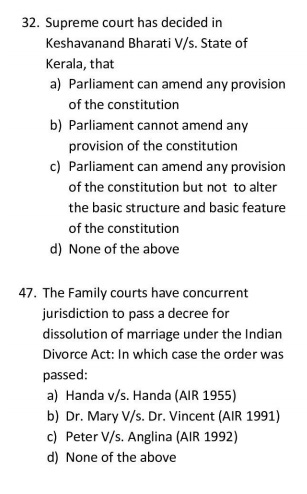
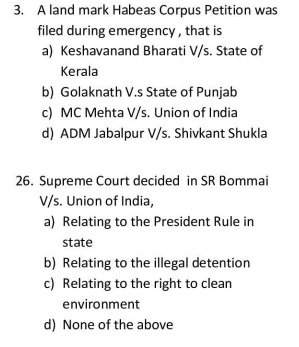 What did you notice? It is impossible to cram details about so many cases or read them in full at this point. Case summaries will also not work, as they will be unwieldy. You will need an effective case list, which are provided in BarHacker Hacksheets for subjects which have a lot of case-laws.
What did you notice? It is impossible to cram details about so many cases or read them in full at this point. Case summaries will also not work, as they will be unwieldy. You will need an effective case list, which are provided in BarHacker Hacksheets for subjects which have a lot of case-laws.
#2 – Emergence of historical or knowledge-based questions
These questions are from Set-A of the XIIth All India Bar Examination (question paper and solution available on the official site here)
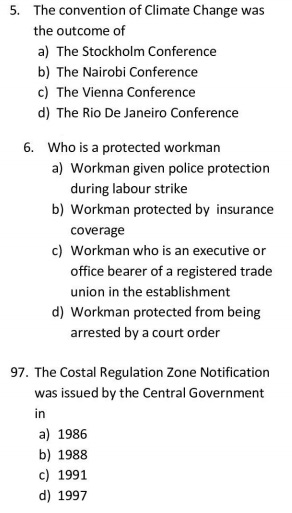
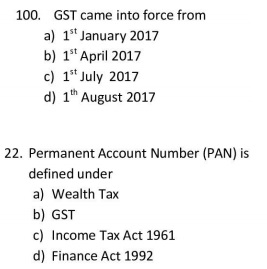 What did you note? These questions require knowledge of certain trivia or historical facts.
What did you note? These questions require knowledge of certain trivia or historical facts.
#3 – Bare Act-based questions are indirect
Consider this question:
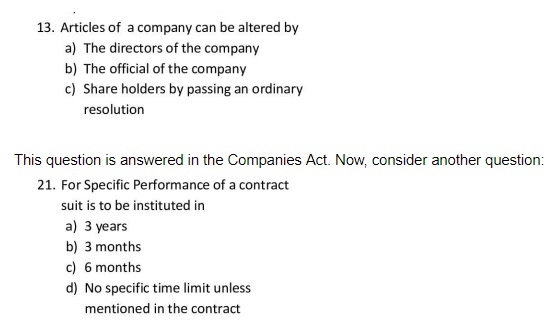
It appears to be a knowledge-based question, or a question based on the Specific Relief Act, but has its answer directly mentioned in the Limitation Act.
Similarly, consider the following question, which emerges from the Code of Criminal Procedure
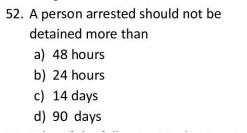
These questions require you to identify the bare act involved and refer to the relevant section to find the answer. I suggest that even if you know the answer, specifically open your bare act and verify that it is correct. Do not leave anything to chance, as you need to clearly score upwards of 45 or 50 marks.
#4 – Emergence of concept-based questions
Concept-based questions are a new question type and are gradually increasing in number. Concept-based questions require real preparation. You cannot just cram your way through them or expect to answer the last minute by going through your study materials.
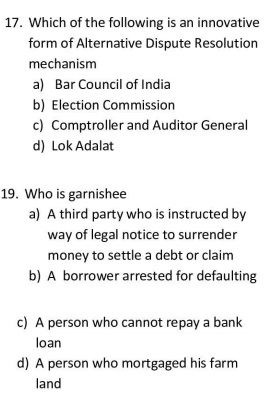
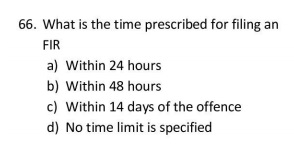
As you may have noticed, solving these questions requires understanding of certain concepts. Additional knowledge-related aspects may be required to crack the question. Thus, it is important for you to relevant basic concepts in every subject.
How can you prepare for such a question paper?
Amongst the above categories of questions, you cannot rule out the possibility of a concept-based, a historical or knowledge based or a case law based question that you do not know the answer to.
However, by building a proper strategy, you can be fully confident that you can correctly attempt all Bare Act based questions and score highly. Fortunately, so far there has been sufficient focus on Bare Act based questions to ensure this.
Further, going armed with powerful Hacksheets (case lists and flowcharts), reading of study materials and sufficient practice maximizes your chances of getting even knowledge-based and concept-based questions right. Let us break this down in further detail.
Create a preparation strategy
- Focus on the most important subjects and prioritize study. Your goal is to cover maximum
- Cover subjects which carry the maximum marks first, that is, Indian Penal Code, Civil Procedure Code, Code of Criminal Procedure, Indian Evidence Act, Constitutional Law, Law of Contract, Specifical Relief, Property Laws, Negotiable Instruments Act.
-
- Amongst subjects which carry the maximum marks, prepare subjects which have the smallest bare act/ least scope first, and then move to subjects which have more detailed sub-categories. For example, Indian Penal Code and Evidence Act have the maximum ratio of marks to volume, that is, they carry the most marks in comparison to the scope of the subject. In comparison, contracts is huge, as it covers Negotiable Instruments Act, Transfer of Property Act and Specific Relief Act, in addition to Indian Contract Act.
-
- Prepare case lists (or print out BarHacker Hacksheets) for subjects that carry lesser marks but have a huge number of cases, such as Constitutional Law, Public Interest Litigation and Professional Misconduct.
-
- Leave out subjects which carry the least marks in comparison to their scope. If a subject carries only 2, 3 or 4 marks, but has a huge scope, you can leave it out. For example, Intellectual Property Law, Company Law, Cyber Law, Administrative Law and Environmental Law (though environmental law-related questions can also come in the Constitutional Law or Public Interest Litigation Head).
2. Get your carry-in materials in order
- Identify all the Bare Acts pertaining to each subject in the All India Bar Examination syllabus and buy them from a book publisher (purchasing physical copies is better than using online versions)
- Print Bare Acts for the subjects in the All India Bar Examination syllabus
- Print all the Hacksheets (if you are a BarHacker crash course subscriber)
Systematic study
Systematic study of the appropriate materials in accordance with the preparation strategy is critical, especially if you have a short amount of time to prepare. As per our estimate, a sound study of the BarHacker Crash Course (including taking some mocks) will take you about 50 – 60 hours. If you do it on your own it will take much longer, because you will have to put in a lot of additional time to plan out the study materials and study them. BarHacker study materials are written in a very simple manner and the sequence is streamlined.
BarHacker supports such study as brief training materials on all the important subjects are provided to give you a conceptual understanding of various concepts. These are much shorter than the textbooks or any guides that you may have studied in college.
If you study on your own, you face the risk of losing focus and getting exhausted. Many people just leave it to chance. However, this can be the root cause of failure. Is your time, confidence and focus not even INR 4500, which is the tuition for BarHacker? Well, I leave that up to you.
Next, as you get familiar with bare acts, use Hacksheets to answer different kinds of questions, you will be able to answer many concept-based questions as your brain will naturally start drawing the connections between different parts of the Bare Acts and how they are linked. You will even be able to answer case law based questions, as BarHacker Hacksheets (available in the Crash Course only) contain lists of landmark cases on various important subjects.
Some people love BarHacker study materials for their brevity and clarity and ask me if they should carry them to the examination hall. I ask them to carry only the Hacksheets, and strongly advise them against carrying our concept-based materials, as you do not have the time to read or learn any concepts in the examination hall. That is a time you are expected to be on fire, finding answers to all the questions, not learn new concepts.
A lot of practice
Learning systematically does not mean you go back to all your LLB textbooks. That will take you months to prepare. You need to practice through a variety of mock tests and quizzes. The BarHacker Crash Course is designed to give you this practice – with every subject you have a quiz to understand whether you have understood the concepts and can browse through relevant bare acts and Hacksheets to find answers. These Hacksheets can be printed and taken to the examination hall. After you cover the study materials and quizzes for the subjects, you can start practising the mock tests in the BarHacker crash course. There are 13 mock tests for practice in that course, including past years’ question papers, which are fed into the system.
While you might think that past years’ papers are already available online, but note there is a big difference between taking a look at the question papers and the solutions from the All India Bar Examination website alone and solving those papers under timed examination conditions online. If you follow the former strategy, you will only have a sense of what questions are asked, but you will not have any idea about your level of preparation. Further, knowing the answers to those questions (which you can access form the official All India Bar Examination website) will not indicate your level of preparation. However, if you perform the latter strategy of taking timed mock tests as per the format of the real paper (including attempting past years’ question papers), you will get valuable insights on your level of preparation.
For example, if you consistently secure 70% or above in 6 or more mocks, you know that you are well-prepared. If you get 40 – 50%, you know that you are on the borderline. So don’t ignore this aspect of you preparation.
 Serato DJ Crack 2025Serato DJ PRO Crack
Serato DJ Crack 2025Serato DJ PRO Crack









 Allow notifications
Allow notifications



Very Nice information for BAR exam preparation